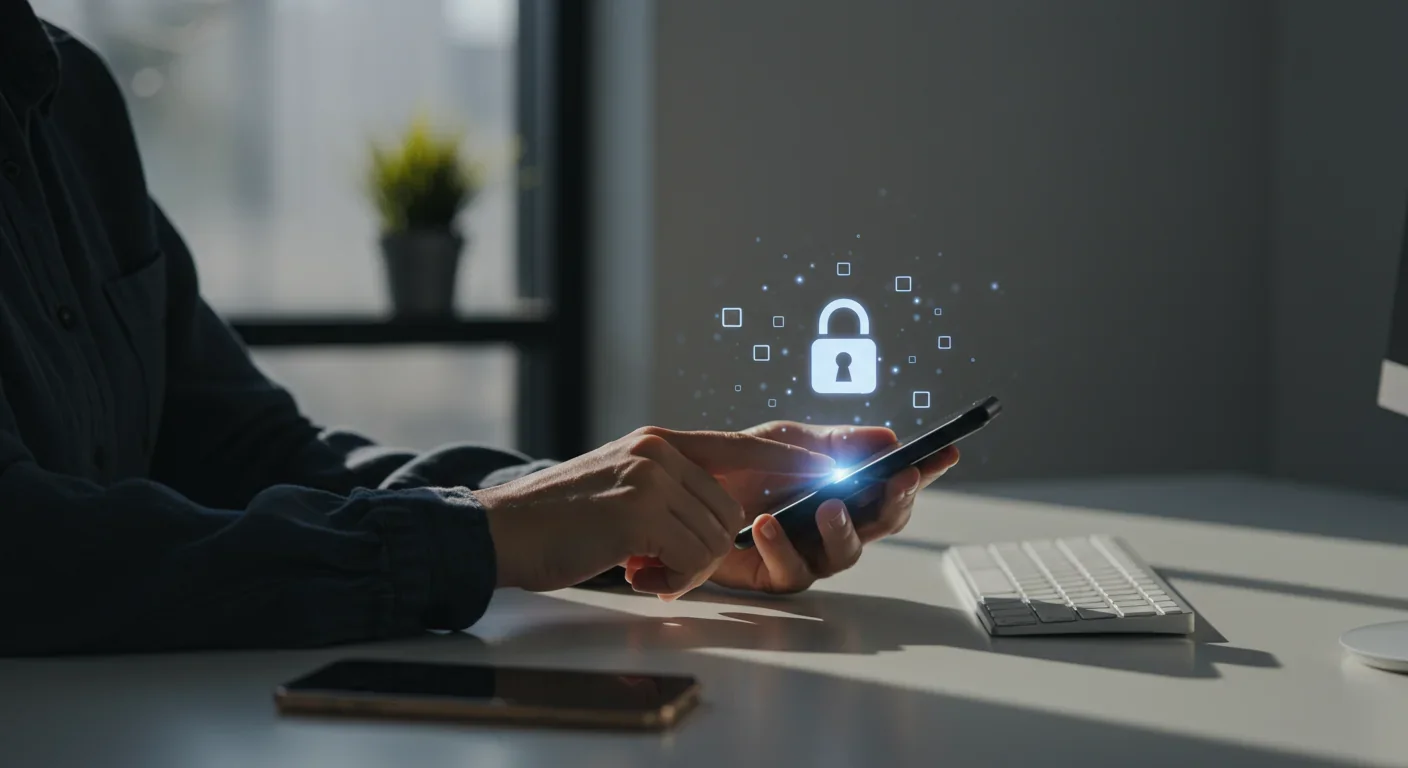How AlphaGo Mastered Go Using Reinforcement Learning

TL;DR: Zero-knowledge proofs let you prove facts about yourself without revealing the underlying data, transforming digital privacy across identity verification, authentication, blockchain, healthcare, voting, and finance through cryptographic protocols that separate verification from disclosure.
By 2030, the average person will need to verify their identity online dozens of times a day. You'll unlock your health records, authorize financial transactions, prove your age, confirm your citizenship, and access countless services. Here's the uncomfortable truth: right now, every one of those verifications leaks information. Every time you prove you're over 21, you're handing over your birthdate. Every time you show your driver's license, you're revealing your address. What if there was a way to prove these things without revealing anything beyond the fact itself? That technology already exists, and it's called zero-knowledge proof. It's not science fiction. It's cryptography that's being deployed today by companies and governments, quietly transforming how we think about privacy and identity in the digital age.

Zero-knowledge proofs sound like a paradox. How can you prove you know something without revealing any information about what you know? It's like convincing someone you have the answer to a puzzle without giving them any hints about the solution. The concept was first introduced in 1985 by cryptographers Shafi Goldwasser, Silvio Micali, and Charles Rackoff in a paper that would fundamentally reshape how we think about digital privacy.
Here's the magic: a zero-knowledge proof is a cryptographic protocol where one party (the prover) can prove to another party (the verifier) that a statement is true without revealing any information beyond the validity of that statement itself. You can prove you're over 18 without revealing your exact age. You can prove you have sufficient funds without disclosing your bank balance. You can prove you're authorized to access a system without transmitting your password.
The breakthrough relies on three core properties that any legitimate zero-knowledge proof must satisfy. First, completeness: if the statement is true, an honest verifier will be convinced by an honest prover. Second, soundness: if the statement is false, no cheating prover can convince the verifier except with negligible probability. Third, zero-knowledge: the verifier learns nothing beyond the fact that the statement is true.
Think of it like proving two balls are different colors to a colorblind friend. They hide the balls behind their back and randomly swap them or don't. You always know if they swapped. After 20 correct guesses, they know the balls differ, but still don't know which colors they are. That's zero-knowledge proof.
Think of it like this: imagine you want to prove to a colorblind friend that two balls are different colors without telling them which is which. You hand them both balls, they put them behind their back, and randomly either swap them or keep them in the same position. Then they show you the balls again and ask if they swapped them. If the balls are truly different colors, you'll always know whether they swapped. If they're the same color, you're just guessing. Repeat this test 20 times, and if you're right every time, your friend knows with near certainty that the balls are different colors, but they still don't know what those colors actually are. That's zero-knowledge proof in action.
The journey from theoretical cryptography to practical implementation took decades, but the turning point came with blockchain technology. When Bitcoin emerged in 2009, it proved that decentralized systems could work, but it also exposed a critical flaw: blockchain transparency means every transaction is visible to everyone. Financial privacy on a public ledger seemed impossible.
Enter Zcash, launched in 2016 as the first cryptocurrency to implement zero-knowledge proofs at scale. Using a specialized type called zk-SNARKs (Zero-Knowledge Succinct Non-Interactive Arguments of Knowledge), Zcash allowed users to make completely private transactions. You could prove you had the funds to make a payment without revealing your wallet balance, transaction amount, or the recipient's identity. It was a watershed moment. Suddenly, zero-knowledge proofs weren't just academic curiosities but production-ready technology handling real value.

The technology spread rapidly across the blockchain ecosystem. Ethereum, the world's second-largest cryptocurrency, integrated zero-knowledge rollups to dramatically increase transaction throughput while maintaining security. Projects like Polygon zkEVM and StarkNet built entire layer-2 scaling solutions around ZKP technology, processing thousands of transactions per second while posting compact proofs to the main chain.
But the real transformation happened when technologists realized these cryptographic tools had applications far beyond cryptocurrency. If you could prove ownership of digital assets without revealing your holdings, why couldn't you prove your age without revealing your birthdate? Why couldn't you prove your creditworthiness without sharing your financial history? Why couldn't you prove you're vaccinated without disclosing your medical records?
Not all zero-knowledge proofs are created equal, and understanding the differences matters because each type solves different problems. The landscape has three major players, each with distinct advantages and tradeoffs.
Zk-SNARKs (Zero-Knowledge Succinct Non-Interactive Arguments of Knowledge) were the first to achieve mainstream adoption. Their superpower is size: SNARKs produce tiny proofs (just a few hundred bytes) that verify extremely quickly, making them ideal for blockchain applications where every byte costs money and verification speed matters. The downside? They require a "trusted setup" ceremony where initial parameters are generated. If those parameters are compromised, the entire system's security collapses. They're also potentially vulnerable to quantum computers, which could break the underlying elliptic curve cryptography within the next decade or two.
Zk-STARKs (Zero-Knowledge Scalable Transparent Arguments of Knowledge) emerged as an evolution designed to address SNARK limitations. They eliminate the trusted setup entirely, using publicly verifiable randomness instead. They're quantum-resistant, relying on hash functions rather than elliptic curves. They scale better with larger computations. The tradeoff? Proof sizes are significantly larger (hundreds of kilobytes instead of hundreds of bytes), and verification takes longer.
"Bulletproofs offer a middle ground between SNARKs and STARKs, eliminating the trusted setup while maintaining relatively compact proof sizes, though verification time scales logarithmically with statement complexity."
— Cryptography Research Community
Bulletproofs offer a middle ground. They don't require a trusted setup, produce relatively small proofs, but verification time grows logarithmically with the size of the statement being proved. They've found a niche in cryptocurrency applications like Monero, where proving transaction validity without revealing amounts is the primary use case.
Which technology wins depends entirely on the application. Need ultra-fast verification and have a way to securely perform a trusted setup? SNARKs. Want transparency and quantum resistance but can tolerate larger proofs? STARKs. Need something simple for range proofs without a setup? Bulletproofs. The ecosystem is converging toward a future where different ZKP technologies coexist, each optimized for specific use cases.

The most transformative applications of zero-knowledge proofs are emerging in digital identity, and the implications extend far beyond blockchain. We're approaching an inflection point where proving who you are no longer requires revealing everything about you.
Consider age verification, one of the most common identity checks we perform. Current systems are absurdly invasive: to prove you're 21 at a liquor store website, you typically upload a photo of your driver's license that includes your full name, address, birthdate, license number, and often a photo. That data gets stored, transmitted, and becomes a target for breaches. With zero-knowledge proofs, you could cryptographically prove you're over 21 without revealing your exact age, let alone all that other information.
Several companies are already building this future. AuthenticID is developing ZKP-based identity verification systems that allow users to selectively disclose specific attributes. Sedicii has created zero-knowledge authentication protocols that verify user credentials without the authenticating party ever seeing the actual credential data. These aren't prototypes; they're production systems handling real identity verification today.
The Electronic Frontier Foundation has been closely monitoring this space, advocating for ZKP-based digital identity while warning against implementation pitfalls. They emphasize that zero-knowledge proofs alone aren't a complete privacy solution. If a system requires you to reveal your identity to get a credential before you can later prove attributes about it using ZKPs, the initial revelation point becomes a vulnerability. True privacy requires zero-knowledge proofs integrated into systems designed from the ground up with privacy as a core principle.
The shift is already happening at scale. Estonia's digital identity system, which gives citizens access to virtually all government services electronically, is exploring ZKP integration to minimize data exposure. The European Union's proposed digital identity wallet framework includes provisions for zero-knowledge attribute verification. In the United States, state governments are investigating how ZKPs could enable privacy-preserving digital driver's licenses.
With zero-knowledge proofs, you could prove to an employer that you have a valid work visa without revealing immigration details, prove your income exceeds a threshold without sharing tax returns, or prove relationship status without revealing your entire history.
Think about what this enables. You could prove to an employer that you have a valid work visa without revealing your immigration status details. You could prove to a lender that your income exceeds a threshold without sharing tax returns. You could prove to a dating app that you're single without revealing your relationship history. Each verification becomes a narrow, specific proof rather than a full data dump.
Passwords are fundamentally broken. We know this. Sixty-five percent of people reuse passwords across multiple accounts. Data breaches expose billions of credentials annually. Even when users follow best practices, sophisticated phishing attacks and keyloggers can capture passwords in transit. The fundamental problem: traditional authentication requires transmitting or storing a secret that, if intercepted, grants complete access.

Zero-knowledge authentication eliminates this vulnerability entirely. The core principle: you prove you know the password without ever transmitting it or storing it anywhere the service provider can access it. Instead, the system challenges you to perform a computation that only someone who knows the password could complete, then verifies your response. The password itself never leaves your device.
Infisign has developed an authentication platform using this approach. When you log in, your device receives a challenge, uses your password (which exists only locally) to generate a zero-knowledge proof, and sends that proof to the server. The server verifies the proof without ever seeing your password. If the server is breached, hackers get nothing useful because there are no stored passwords to steal.
The security implications are profound. Phishing becomes much harder because there's no password to phish. Database breaches don't expose credentials because credentials aren't stored. Man-in-the-middle attacks can't intercept your secret because it's never transmitted. The entire threat model shifts.
This approach is gaining traction beyond startups. Major identity providers are experimenting with zero-knowledge protocols as part of the broader push toward passwordless authentication. The FIDO2 standard for hardware security keys incorporates zero-knowledge principles. Browser makers are exploring integration points that would make ZKP authentication as seamless as typing a password, but exponentially more secure.
While privacy was the original killer app for zero-knowledge proofs in blockchain, an unexpected secondary benefit has become equally important: scalability. This dual utility is accelerating adoption across the cryptocurrency ecosystem and potentially beyond.
The scalability problem is simple: blockchains require every node to verify every transaction, which creates an upper limit on throughput. Bitcoin processes about 7 transactions per second. Ethereum manages around 15. Visa, by comparison, handles thousands. Zero-knowledge rollups offer a solution: bundle hundreds or thousands of transactions, compute them off-chain, and then post a single compact proof to the main blockchain that all those transactions were valid.
"Zero-knowledge rollups are increasing Ethereum's transaction capacity by 100x or more while maintaining full security guarantees, proving that privacy and scalability aren't competing goals but complementary benefits."
— StarkWare Research Team
StarkWare, one of the leading companies in this space, has built systems that increase Ethereum's capacity by 100x or more. StarkNet, their layer-2 network, processes transactions at a fraction of the cost while inheriting Ethereum's security guarantees. The ZK proof essentially says: "Trust me, I executed these 1,000 transactions correctly, and here's cryptographic proof you can verify in milliseconds instead of re-computing everything yourself."

Polygon zkEVM takes this further, creating a zero-knowledge version of Ethereum that's fully compatible with existing applications. Developers can migrate their apps without changing a single line of code, yet gain massive performance improvements and privacy features. This compatibility is crucial for adoption since rewriting applications to use new cryptographic systems is expensive and error-prone.
The approach is spreading beyond Ethereum. Cardano is exploring ZK technology to improve its smart contract capabilities. Mina Protocol built an entire blockchain that stays constant in size (about 22 kilobytes) regardless of usage by using recursive zero-knowledge proofs. Instead of storing the full transaction history, Mina stores a proof that the current state is valid.
What makes this especially significant: the privacy and scalability benefits are complementary, not competing. You get both simultaneously. Transactions are private AND the network processes them faster. This dual advantage is why investment in ZKP blockchain infrastructure exceeded $1 billion in 2024, according to industry estimates.
Few sectors need privacy more desperately than healthcare, yet few have more catastrophically failed to achieve it. Medical data breaches exposed over 90 million patient records in 2024 alone. The fundamental tension: healthcare requires data sharing for treatment coordination, insurance verification, research, and public health, but current systems achieve that sharing by giving far too many parties access to far too much information.
Zero-knowledge proofs offer a way out. Imagine proving to an insurance company that you're up to date on preventive care without revealing which specific tests you've taken or the results. Imagine proving you're vaccinated without sharing your entire immunization record. Imagine allowing researchers to verify clinical trial eligibility without exposing your complete medical history.
Several health systems are already piloting these approaches. A research project described in Blockchain Healthcare Today demonstrated a ZKP-based system for verifying patient consent in clinical trials. Patients proved they met enrollment criteria without revealing underlying health conditions. Researchers verified eligibility without seeing protected health information until necessary.
The applications extend to prescription verification, medical licensing, insurance claims, and genomic privacy. You could prove your genetic profile indicates low risk for a condition without sharing your actual DNA sequence. You could prove a medication is appropriate for your health status without your pharmacy seeing your full diagnosis list. You could enable public health surveillance that counts disease prevalence without identifying individual patients.
GDPR compliance creates additional incentive: zero-knowledge proofs perfectly align with data minimization principles. If you can verify a fact without transmitting underlying data, you're not collecting it at all, eliminating storage, breach, and compliance burdens.
GDPR compliance creates additional incentive for European healthcare providers. Zero-knowledge proofs align perfectly with the regulation's data minimization principle: collect and process only the minimum data necessary. If you can verify a fact without transmitting the underlying data, you're not collecting it at all, eliminating storage, breach, and compliance burdens.
The technical challenges are real. Medical data is complex and highly dimensional. Creating zero-knowledge proofs for sophisticated medical queries requires significant computational resources. Standardization across health systems remains elusive. But the direction is clear: healthcare is moving toward cryptographic verification that separates the question being answered from the data used to answer it.
Democratic elections face a paradox: votes must be secret to prevent coercion, yet the counting must be transparent to prevent fraud. Traditional paper ballot systems resolve this through physical security and observer oversight, but digital voting has struggled to achieve the same balance. Zero-knowledge proofs might finally make cryptographically secure, verifiable electronic voting possible.
The core challenge: you need to prove your vote was counted correctly without revealing how you voted. ZKP-based voting systems address this by giving each voter a receipt that cryptographically proves their vote was included in the final tally while keeping the vote content secret. You can verify your specific vote was counted, and anyone can verify the total count is accurate, but no one (including you, after casting) can prove how you voted to a third party.
This last property is crucial. If voters could prove to others how they voted, vote buying and coercion become possible. Zero-knowledge election systems prevent this through a clever mechanism: your receipt proves inclusion in the final count but can't demonstrate which candidate you selected. The math works out so that you can check your vote was counted, auditors can verify the count is correct, but you can't sell or be forced to prove your vote to anyone else.
Estonia, already a leader in digital government, is researching ZKP integration for its internet voting system. Switzerland has piloted blockchain-based voting with zero-knowledge verification for canton-level elections. These aren't replacing traditional voting yet, but they're proving the concept at scales that matter.
The implications extend beyond government elections. Corporate board elections, union votes, shareholder decisions, and community governance could all benefit from the same properties: secret ballots with verifiable counting. Decentralized autonomous organizations (DAOs) in the cryptocurrency space are already implementing ZKP voting to govern billion-dollar treasuries while protecting member privacy.
Banks and financial institutions face competing pressures. Customers demand privacy. Regulators demand transparency. Anti-money laundering laws require knowing your customer. Privacy regulations restrict data collection. How do you satisfy both simultaneously? Zero-knowledge proofs offer a technical solution to a political problem.
Regulatory solutions using ZKPs are emerging that let financial institutions prove compliance without revealing customer data. A bank could prove to regulators that no transactions exceeded reporting thresholds without disclosing actual transaction amounts. A customer could prove their funds came from legitimate sources without revealing their complete financial history. An exchange could prove it maintains sufficient reserves without exposing its wallet addresses to competitors or hackers.
The venture capital firm Andreessen Horowitz published a detailed framework for privacy-protecting regulatory compliance using zero-knowledge proofs, arguing that privacy and compliance aren't opposing forces but can be simultaneously achieved through clever cryptography. Their proposal: financial institutions would generate zero-knowledge proofs of compliance with specific regulations, submit those proofs to regulators, and maintain customer privacy throughout.
Traditional financial institutions are paying attention. JPMorgan Chase has experimented with ZKP technology in its Quorum blockchain platform (since spun out). Credit card companies are exploring zero-knowledge range proofs for transaction verification that would let merchants confirm a charge is below a fraud threshold without learning the exact amount. Auditing firms are investigating how zero-knowledge proofs could enable privacy-preserving financial audits.
The shift has profound implications for financial privacy, which has been steadily eroding for decades. Every transaction you make creates a data trail. Banks know where you shop, what you buy, and who you pay. Credit bureaus aggregate this into detailed profiles sold to third parties. Zero-knowledge verification could reverse this trend. You'd prove creditworthiness without sharing transaction history. You'd prove account ownership without revealing your balance. You'd authorize payments without exposing your spending patterns.
While cryptocurrency drove initial ZKP adoption, enterprises are discovering applications in supply chain, business intelligence, and inter-company verification. The common thread: businesses need to share proof of facts without exposing competitive intelligence or sensitive operational data.
Supply chain verification represents a massive opportunity. A manufacturer could prove to customers that components came from ethical sources without revealing supplier identities. A logistics company could prove on-time delivery rates without exposing client lists. A food producer could prove safety compliance without revealing proprietary processes.
Business intelligence sharing becomes possible when competitors can verify aggregate statistics without seeing underlying data. Industry associations could publish accurate market reports where each company proves their contribution is accurate without revealing their specific numbers. This solves a persistent problem: companies want industry benchmarks to guide strategy, but don't want to hand detailed data to competitors.
Inter-company verification streamlines partnerships. When evaluating a potential vendor, you could verify they meet minimum revenue, employee count, or certification requirements without seeing their books. When qualifying for a contract, you could prove you meet requirements without exposing your entire business structure. These applications reduce friction, speed up business processes, and protect competitive information.
The consulting firm Deloitte has identified zero-knowledge proofs as a key technology for privacy-preserving business intelligence. They're building tools that let clients benchmark against industry peers using ZKPs to ensure each participant's confidential data stays confidential while enabling accurate aggregate reporting.
Technical barriers remain significant. Creating proofs for complex business logic requires specialized expertise. Standardization across industries is minimal. Computing costs for generating proofs can be high for complicated verifications. But the business case is clear enough that enterprise adoption is accelerating despite these challenges.
Despite the promise, zero-knowledge proofs face real obstacles preventing widespread adoption outside cryptocurrency. Understanding these limitations is essential for realistic expectations about when this technology will truly go mainstream.
Computational complexity tops the list. Generating zero-knowledge proofs is computationally expensive, often requiring specialized hardware or significant processing time. A University of Michigan study found that even with GPU acceleration, complex ZKP generation can take seconds to minutes depending on the statement being proved. That's acceptable for a financial transaction but problematic for real-time authentication or rapid-fire verifications.
Proof size and verification time vary dramatically by protocol. While zk-SNARKs produce compact proofs that verify quickly, the required trusted setup ceremony is operationally complex and becomes a single point of failure. Zk-STARKs eliminate that vulnerability but create proofs 10x to 100x larger, which matters when bandwidth is constrained or verification happens on resource-limited devices like smartphones.
Integration complexity prevents mainstream developers from easily adopting ZKP technology. Creating zero-knowledge proofs requires understanding advanced cryptography and using specialized tools and languages unlike conventional programming. The barrier to entry is high. Libraries and frameworks are improving, but we're still far from the point where a typical software engineer can integrate ZKPs as easily as they'd add password hashing.
Standardization remains fragmented. Unlike established cryptographic primitives like AES encryption or SHA hashing, where standards are well-defined and implementations are interoperable, the ZKP landscape has competing protocols, libraries, and approaches. A proof generated by one system often can't be verified by another. This fragmentation slows adoption since businesses hesitate to invest heavily in technologies that might not interoperate with partners' systems.
User experience presents its own challenges. For zero-knowledge authentication or identity verification to work, users need software that can generate proofs, which typically means installing apps or browser extensions. The process must be seamless, or users will choose convenience over privacy. Getting the UX right is as important as getting the cryptography right, and we're still in early days on that front.
Quantum computing looms as a future threat. Many current ZKP implementations rely on cryptographic assumptions that quantum computers could break. While quantum-resistant alternatives exist (like zk-STARKs based on hash functions), the transition period will be technically complex and the timeline uncertain. We don't know exactly when quantum computers will reach the capability to break current systems, but when they do, huge amounts of infrastructure will need upgrading.
The trajectory is clear even if the timeline is uncertain. Zero-knowledge proof technology will move from a blockchain curiosity to a fundamental building block of digital infrastructure, though the transition will be gradual and uneven across sectors.
Near term (2025-2027), expect widespread deployment in specific verticals where the value proposition is overwhelming. Identity verification for age-restricted purchases online. Privacy-preserving authentication for high-security applications. Blockchain scaling solutions becoming the default for layer-2 networks. These use cases already have working implementations; they just need market adoption.
Medium term (2027-2030), integration into consumer devices and mainstream platforms. Smartphone operating systems could include zero-knowledge proof capabilities natively, letting any app verify user attributes without seeing underlying data. Browsers could support ZKP-based authentication protocols directly. Digital identity wallets issued by governments could leverage zero-knowledge selective disclosure as a core feature.
Longer term (2030+), a fundamental shift in how we think about data sharing and verification. The question will flip from "Why would you use zero-knowledge proofs?" to "Why would you ever verify something by exposing the underlying data when you don't have to?" Just as HTTPS encryption went from optional to universal because the technology matured and the risks of unencrypted communication became clear, zero-knowledge verification could become the default privacy-preserving approach for digital interactions.
The skills gap will narrow as universities integrate zero-knowledge cryptography into computer science curricula and companies build higher-level abstraction layers that hide complexity from developers. Tools like zkSync and Polygon's developer frameworks are already making it easier to build ZKP applications without deep cryptographic expertise, a trend that will accelerate.
Regulation will shape adoption significantly. If governments mandate privacy-preserving technologies for certain applications, deployment will accelerate. If they resist ZKPs due to law enforcement concerns about reduced visibility into transactions and identity, adoption could stall. The GDPR example shows how regulation can drive privacy technology adoption; similar dynamics could play out globally.
If you're a consumer, start noticing when companies ask for more information than they need. Question whether age verification really requires uploading your driver's license or if a yes/no answer about being over 21 would suffice. Seek out services that offer zero-knowledge options when they exist. Vote with your data by choosing privacy-preserving alternatives.
If you're a developer or technical decision-maker, now is the time to build expertise. Zero-knowledge proofs are complex, but they're learnable, and early movers will have a competitive advantage. Explore libraries like circom, libsnark, or arkworks. Experiment with ZKP-based authentication in side projects. Understand the tradeoffs between different protocols. When you're building systems that handle sensitive data, ask whether zero-knowledge verification could reduce your liability and improve user privacy simultaneously.
If you're in a regulated industry, pay close attention to how ZKPs could solve compliance problems that seem unsolvable today. Start conversations with legal and compliance teams about what becomes possible when you can prove compliance without exposing data. Pilot projects now, while the technology is maturing, so you're ready when regulatory frameworks explicitly recognize or require privacy-preserving verification.
If you're a policymaker or regulator, understand that zero-knowledge proofs aren't a threat to legitimate oversight but a tool for achieving oversight while protecting privacy. Work with technologists to understand what's possible. Craft regulations that encourage privacy-preserving compliance rather than forcing false choice between transparency and privacy.
Zero-knowledge proofs represent more than a technical advance. They're a paradigm shift in how we establish trust in digital systems. For the entire history of computing, verification has meant inspection. To trust, you had to see. To prove, you had to reveal. Zero-knowledge proofs break that assumption.
We're moving toward a world where privacy and verification aren't opposing goals but complementary capabilities enabled by mathematics. Where proving you're authorized doesn't require exposing your credentials. Where companies can demonstrate compliance without opening their books. Where citizens can verify government is following the rules without governments tracking citizens' every move.
The implications extend to power dynamics. Data has become a source of power; whoever has access to information has leverage. Zero-knowledge systems redistribute that power by letting individuals and organizations prove facts without surrendering the underlying data that could be misused, sold, or breached. In a world of increasing digital surveillance, that capability matters.
This isn't utopian thinking. It's practical cryptography solving real problems. The technology works. It's being deployed at scale. The questions now are about adoption speed, user experience, and whether we collectively choose to build privacy into our digital infrastructure or continue accepting surveillance as the price of convenience.
The choice isn't between privacy and functionality. Zero-knowledge proofs prove we can have both. The question is whether we'll demand it.

Curiosity rover detects mysterious methane spikes on Mars that vanish within hours, defying atmospheric models. Scientists debate whether the source is hidden microbial life or geological processes, while new research reveals UV-activated dust rapidly destroys the gas.

CMA is a selective cellular cleanup system that targets damaged proteins for degradation. As we age, CMA declines—leading to toxic protein accumulation and neurodegeneration. Scientists are developing therapies to restore CMA function and potentially prevent brain diseases.

Intercropping boosts farm yields by 20-50% by growing multiple crops together, using complementary resource use, nitrogen fixation, and pest suppression to build resilience against climate shocks while reducing costs.

The Baader-Meinhof phenomenon explains why newly learned information suddenly seems everywhere. This frequency illusion results from selective attention and confirmation bias—adaptive evolutionary mechanisms now amplified by social media algorithms.

Plants and soil microbes form powerful partnerships that can clean contaminated soil at a fraction of traditional costs. These phytoremediation networks use biological processes to extract, degrade, or stabilize toxic pollutants, offering a sustainable alternative to excavation for brownfields and agricultural land.

Renters pay mortgage-equivalent amounts but build zero wealth, creating a 40x wealth gap with homeowners. Institutional investors have transformed housing into a wealth extraction mechanism where working families transfer $720,000+ over 30 years while property owners accumulate equity and generational wealth.

AlphaGo revolutionized AI by defeating world champion Lee Sedol through reinforcement learning and neural networks. Its successor, AlphaGo Zero, learned purely through self-play, discovering strategies superior to millennia of human knowledge—opening new frontiers in AI applications across healthcare, robotics, and optimization.